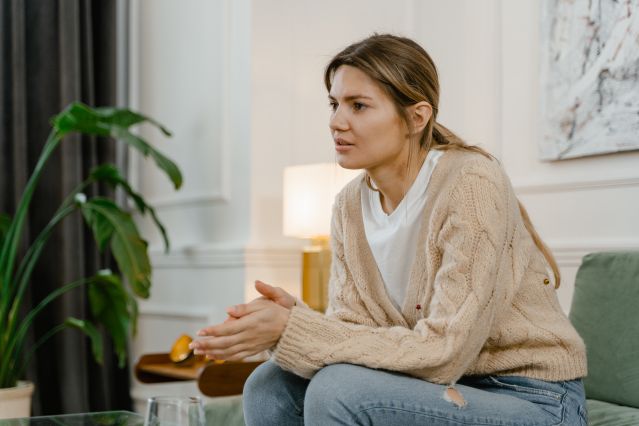Domestic Violence
Victims of Abuse Penalized for Victimization
Being with a violent partner can get a victim with kids a charge of neglect.
Posted October 16, 2023 Reviewed by Michelle Quirk
Key points
- Victims of a violent intimate partner with children are at risk for child neglect and risk losing custody.
- It's well documented that leaving a violent partner can escalate the violence and possibly to lead to murder.
- Entrapment created by the violent partner takes away the victim's control and ability to exercise choice.

Intimate partner violence creates a dangerous entrapment in the home for the victim who can also be held responsible for the children living in such an environment. The agencies that are set up to protect victims with children may intervene and determine that the victims themselves are neglectful in parenting their children just by being with a violent partner. A determination of neglect raises the risk of losing custody. Intimate partner violence is tragic, and, in the end, it makes no sense to hold the victim responsible for the violence they endure.
Intimate Partner Violence
Intimate partner violence (IPV) is common, impacting millions of people each year in the United States. According to the Centers for Disease Control and Prevention,
- One in three women and one in four men report severe physical violence from an intimate partner in their lifetime.
- One in five women and one in 13 men experience sexual violence by an intimate partner in their lifetime.
- Seventy-five percent of female IPV survivors and 48 percent of male IPV survivors experience some form of injury related to IPV.
- Posttraumatic stress disorder (PTSD) symptoms, concern for safety, fear, needing help from law enforcement, and missing at least one day of work are common impacts reported.
Looking at homicide rates, the data from U.S. crime reports show the following:
- One in five homicide victims are killed by an intimate partner.
- More than half of female homicide victims in the United States are killed by a current or former male intimate partner.
These statistics illustrate the prevalence and seriousness of IPV. Let’s be sure to recognize the impact of IPV on the targeted person, their loss of agency, and, for some, the belief to stay in order to protect their children.
Understanding the Plight of the Victim
When it is possible, it’s always best to do what you can to escape an abusive partner. However, it’s extremely complicated and often can be the most dangerous with a violent partner to do so. One study by the U.S. Department of Justice, reported from interviews with men who have killed their spouses, says that either threats of separation by their partner or actual separations were the most frequent precipitating event that led to the murder.
There are many reasons victims might stay with their abuser. Some of them cite the factors below, according to the National Coalition Against Domestic Violence (NCADV):
- They believe their abuser will follow through on their threats that they will hurt or kill them, hurt or kill the children, or harm or kill pets.
- Twenty percent of homicide victims who were not the victim themselves were family members, friends, neighbors, persons who intervened, law enforcement responders, or bystanders.
- They fear single parenting with less financial support.
- They fear losing custody of their children if they leave or divorce their partner.
- They fear false accusations in court from their abuser with no way to disprove them.
- Religious or cultural beliefs and practices prevent them from leaving.
- The belief that children fare better with two parents together prevents them from leaving.
- The police may dissuade the victim filing charges from leaving; some dismiss or minimize the abuse or side with the abuser.
- Despite issuing a restraining order, there may be no prevention of a released abuser from returning and repeating the abuse.
- Despite greater public awareness and increased availability of housing for fleeing victims of violence, there are not enough shelters to keep victims safe.
Staying with their abuser to protect the children is another reason I hear from victims. In this way, their children will not be alone for stretches of time with their abuser. Being present with their children in the home allows them to provide supervision and protection. Also, some believe that co-parenting effectively in the best interest of the children will not be possible with their abuser.
Where We Are Now
In Massachusetts and nationwide, child welfare agencies often cite abuse victims for child neglect, essentially holding them responsible for their own victimization, IPV advocates say (Boston Globe, September 10, 2023).
As of 2021, only 15 states have policies that protect IPV victims from being held responsible for failing to protect their child from exposure to domestic violence. (Victor B. et al. Child Maltreatment, 2021).
The victim of IPV experiences a serious loss of agency over their own life. The range of mental and physical health issues associated with the trauma of IPV contribute. To see the victim as having a choice and not acting on it is erroneous and a tragic accusation of the victim that only retraumatizes them.
©Lambert
National Domestic Violence Hotline: 800-799-7233
References
Victor, B.G., Rousson, A.N., Henry, C., Dalvi, H.B., Mariscal, S.E. 2021. “Child Protective Services Guidelines for Substantiating Exposure to Domestic Violence as Maltreatment and Assigning Caregiver Responsibility: Policy Analysis and Recommendations.” Child Maltreatment. 26(4):452–463.
For more conditions that might keep someone from leaving an abusive partner, see https://ncadv.org/why-do-victims-stay


